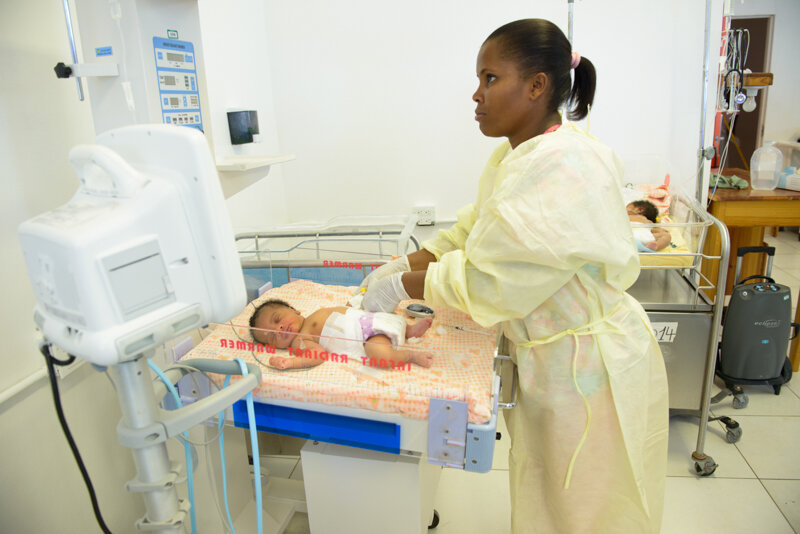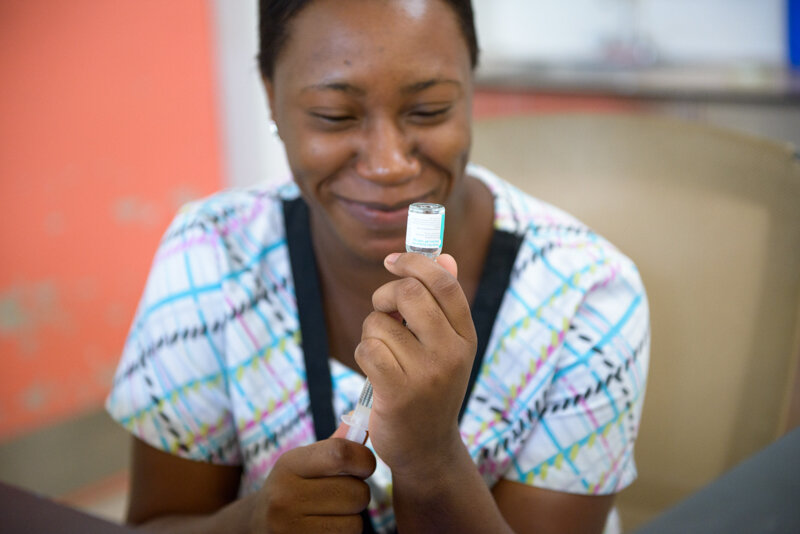IZUMI Foundation nurtures partnerships to address complex health challenges across Africa, Latin America, and the Caribbean.
Through our partnerships, IZUMI Foundation supports organizations and programs that help alleviate suffering and improve health and healthcare for children, families, and communities. With an emphasis on supporting organizations working in rural, remote, or under-served regions, IZUMI Foundation and its partners address a myriad of health challenges: from diseases with high rates of mortality, to quality health systems, to conditions that cause severe suffering, disability, and economic burden. Many of these health challenges are preventable, solvable, and treatable when communities have access to primary healthcare, improved living conditions, and adequate nutrition.
IZUMI Foundation’s grantee partners work hand-in-hand with communities to identify and solve their own challenges, engage with local and national governments to develop healthcare system improvements, address the social determinants of health, collaborate across many countries, or grow only within one community. However, all IZUMI partners are driven by conviction, commitment, and compassion.
IZUMI Foundation focuses on health programs integrated across five global health priorities:
Maternal & Neonatal Health
In the last 20 years, there have been significant improvements in maternal and child health. Maternal deaths have decreased by 44% worldwide; however, over 800 women still die each day from preventable pregnancy and childbirth-related complications. Each year, 2.5 million infants die during the first month of life. The immediate causes of newborn death include complications related to premature birth, infection, birth defects, and delivery-related complications. Many of these conditions can be easily prevented or treated.
IZUMI Foundation supports effective programs that sustain both the mother and child, recognizing that newborn and maternal health and survival are closely linked. By increasing pregnant women’s access to quality care before, during, and after childbirth, mothers and babies around the world can have a bright future. We believe keeping mothers healthy improves the health of the whole family.
Neglected Tropical Diseases
Neglected Tropical Diseases (NTDs) affect more than one billion people worldwide. Found mainly in tropical and subtropical regions, these neglected diseases persist in under-resourced communities where people lack access to healthcare and adequate water, hygiene, and sanitation. Despite being prevented, diagnosed, or treated at very low cost, NTDs are also neglected because they command relatively little attention from healthcare systems and medical researchers.
The suffering and disability caused by NTDs, as well as the social stigma, keep children out of school, impede an individual’s ability to work, and prevent families and communities from thriving.
IZUMI Foundation partners with organizations that address NTDs identified by the World Health Organization, with past programs targeting schistosomiasis, trachoma, intestinal worms, and many others. The majority of programs supported focus on morbidity management, disability prevention, active case finding, education, and mass drug administration.
Nutrition
Well-nourished children and families are better equipped to reach their fullest potential. Proper nutrition is especially important for a child’s early development and physical and cognitive growth. Nutrition-related factors contribute to 45% of deaths for children under the age of five.
Families and communities that suffer from malnutrition often lack access to healthy food, healthcare services, and clean water and sanitation. Malnutrition perpetuates a cycle of poverty and poor health.
IZUMI Foundation partners with organizations that provide local solutions to malnutrition, including agricultural development, nutrition education, and culturally-appropriate food fortification. Often, effective programs rely on simple interventions, the creative use of available resources, and an understanding for the realities of family and community life.
Infectious Diseases
Over the last several years, major strides have been made in fighting many infectious diseases around the world. Global malaria death rates have dropped by 60% since 2000, and 8 out of 10 mothers living with HIV receive treatment to prevent HIV transmission to their babies.
Many infectious diseases, however, still have a devastating effect on communities. Too often, the underlying problems include a lack of community-level healthcare delivery, basic supplies and medications, clean water, and a lack of adequate nutrition.
IZUMI Foundation supports programs that address infectious diseases with high morbidity and mortality. These programs often work to build primary care capacity, create greater access to care, and facilitate integrated health programming.
Healthcare System Infrastructure
A functioning health system builds the capacity of many essential healthcare components.
Health systems need infrastructure that facilitates effective care: quality service delivery; a professionally trained, sufficiently paid, and well-supported workforce; functioning health information systems; a reliable supply of pharmaceuticals and equipment; a fair and efficient distribution of resources to the people who need them; and a functioning administration with effective governance.
IZUMI Foundation supports organizations that strengthen local healthcare systems. Previous initiatives include constructing, renovating, and capacitating laboratories; improving medical supply chains; revamping medical training curricula; and introducing a variety of quality improvement programs.
Geographic Focus

Where We Work
Made with Visme
At IZUMI Foundation, we are committed to supporting our partner organizations’ identified goals and priorities. We believe in fostering trusted partnerships with our partner organizations by building long-term relationships rooted in regular communication, in-person and virtual meetings, and site visits.
IZUMI Foundation recognizes that working toward change takes time, and when possible, we look to support long-term relationships. Because of our long-term partnerships, IZUMI Foundation is only able to fund a small number of new organizations (about 3-4) each year. Because we only award a few new grants each year, and to respect your organization’s valuable time, IZUMI does not accept unsolicited proposals.
IZUMI Foundation is not accepting unsolicited Letters of Inquiry at this time.













